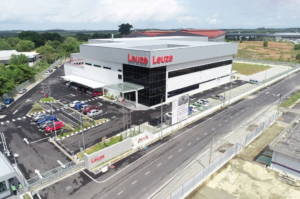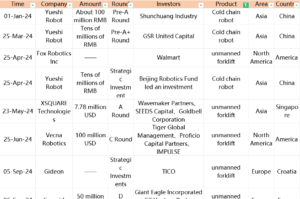“Despite a decline in market demand for the lithium battery industry compared to 2023, with growth significantly slowing, orders have concentrated on established leading companies. In 2024, our lithium battery business revenue proportion decreased from 80% to around 50%, while total revenue still saw a slight increase,” says Xu Bo, Marketing General Manager of Zhuhai Makerwit Technology Co., Ltd. “Amid challenging market conditions, Makerwit remained focused on the renewable energy sector and actively explored new applications, achieving steady growth in 2024.”

To delve deeper into Makerwit’s 2024 growth trajectory and its plans for 2025, New Strategy Mobile Robots conducted an exclusive interview with Xu Bo to discuss trends in the lithium battery and photovoltaic sectors and the company’s strategies.
Breaking Out and Rooting in Renewable Energy
Founded in 2013, Makerwit Technology is a high-tech enterprise specializing in industrial intelligence. The company provides smart factory and logistics system solutions alongside core technological products. Recognized as a national-level “Specialized and Innovative Little Giant,” Makerwit’s offerings include intelligent industrial robots, smart warehousing systems, and dispatch systems. These products integrate industrial and information systems to enable end-to-end, automated, and customized intelligent solutions for manufacturing enterprises.
Known for its stellar performance in renewable energy, Makerwit has led the lithium battery sector. As early as 2017, before the battery industry boom, the company strategically focused on the market. Its logistics solutions now cover the entire lithium battery production process, with AGVs tailored for each stage, including material lifting, heavy-duty handling, packaging, and specialized tasks like coating, cutting, and assembling.
“Makerwit was among the first in China to achieve full-process intelligent logistics for battery production,” Xu notes. “Our AGVs meet industry demands for efficiency, safety, and smart manufacturing, facilitating seamless automation, streamlined workflows, and enhanced digitalization and flexibility in production lines.” The company has partnered with leading firms like Zhuhai Guanyu, Ganfeng Lithium, and EVE Energy, securing a leading position in mobile robot shipments within the lithium battery industry.
While solidifying its position in lithium batteries, Makerwit has extended its expertise to other renewable energy sectors, such as photovoltaics.

Navigating Challenges in the Photovoltaic Sector
Following explosive growth in 2023, the photovoltaic (PV) industry faced overcapacity in 2024, leading to a sharp decline in AGV demand—estimated to drop by nearly 50% compared to the previous year. Many PV projects were postponed or canceled, and industry operating rates hit record lows.
In response, Makerwit focused on customized solutions. For example, its silicon rod automatic loading and unloading AGV serves seven slicing machines with a single unit, reducing investment costs by over 40%. “This product delivers strong investment returns and greater stability, helping clients reduce costs and improve efficiency,” Xu shares. With a two-year exclusivity agreement in place, the product is slated for broader market release in 2026.
Beyond photovoltaics, Makerwit is expanding into sectors like construction machinery. In 2024, the company launched heavy-duty AGVs for this industry, including models handling up to 200 tons. “The construction machinery sector offers immense opportunities as it transitions from traditional conveyor lines to flexible AGV systems,” Xu explains. “This shift is driving new projects and creating growth potential for mobile robot manufacturers.”
Strengthening Innovation Amid Competition
As the mobile robot industry matures, growth rates have slowed, competition has intensified, and product differentiation has diminished. Cost pressures are mounting as customers become increasingly price-sensitive.
To address this, Xu emphasizes innovation and cost optimization. “Core technology development and localization of key components are crucial to reducing costs. Customization is another key strength that allows us to tailor products to clients’ unique processes, integrating lean production principles to deliver cost-effective solutions.”
For instance, Makerwit’s AGVs are designed to transport multiple trays in one trip, improving efficiency significantly compared to competitors. The company’s commitment to R&D, with a team of over 160 employees comprising 40% of its workforce, ensures continual innovation. Recent developments include graphite boat transfer AGVs for the PV industry and heavy-duty AGVs for construction machinery.

Expanding Globally
Recognizing the potential of Southeast Asia’s manufacturing upgrade initiatives, Makerwit began expanding overseas in 2023, establishing an office in Penang, Malaysia, and building a local service team. The company is also advancing its presence in Singapore and other regional markets.
Southeast Asia provides a favorable environment for Chinese mobile robot companies, offering open investment policies and strong industry support, Xu notes. Additionally, many of Makerwit’s clients are setting up operations in the region, further driving its international expansion.
By 2024, Makerwit had achieved significant milestones in markets like Malaysia, Korea, Japan, and Singapore. Looking ahead to 2025, Xu highlights a dual focus on deepening expertise in renewable energy and strengthening its global footprint. “Our priority is to maintain profitability while delivering sustainable solutions for our clients, ensuring Makerwit’s long-term growth and success,” he concludes.
By focusing on core strengths, exploring new markets, and prioritizing innovation, Makerwit Technology continues to thrive despite challenges, setting a strong foundation for sustained growth in 2025 and beyond.









探索者论坛-scaled.jpg)
